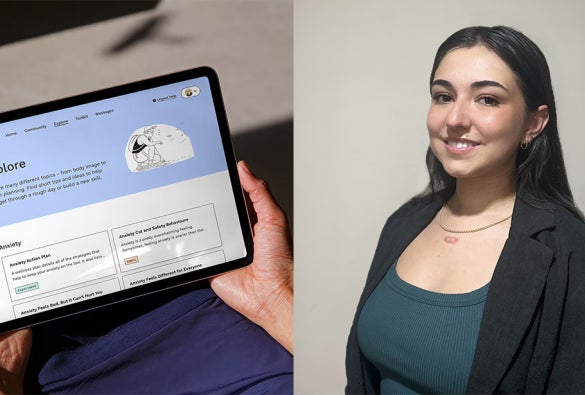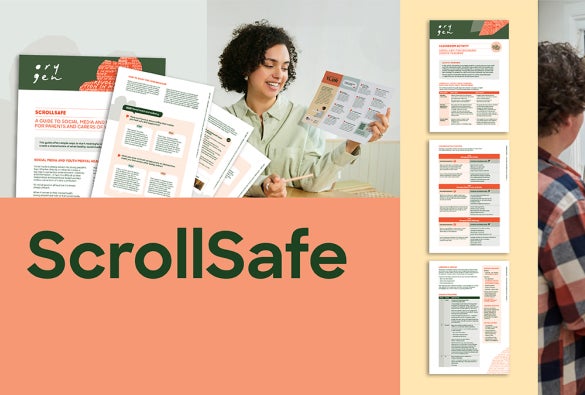Course information
Entry requirements
- Completed an AQF Level 7 Bachelors degree in a cognate discipline such as Health Science, Social Work, Psychology, Medicine, Counselling, Criminal Justice, Youth Work, or Education OR
- Completed an AQF Level 7 Bachelor in any discipline and at least 2 years of approved work experience OR
- A Graduate Certificate in Mental Health OR
- A Graduate Certificate in Child and Adolescent Mental Health
Career options
With VU Online’s Master of Mental Health, you can enhance your skills and transform mental health services. You’ll gain work-based knowledge and skills in evidence-based assessment and intervention approaches in mental health, which you can use to successfully engage with individuals, families, carers and clinicians across therapeutic, community and clinical mental health settings.
Student support
VU Online provides you with the support you need, when you need it, during your course. Our support network has a single focus on ensuring you are entirely supported to succeed in your studies.
Our highly experienced academics are responsive and accessible and understand how to deliver a quality online learning experience. You will also be introduced to your very own Student Success Advisor, who provides motivation and one-on-one personalised assistance with non-academic matters throughout your course.
You’ll experience the support of your community through chat, virtual seminars and discussion board activity. Remember, your support network is only a phone call and email away.
Fees and FEE-Help
Our Master of Mental Health costs $2,870-$2,950 per unit*. The total cost for all 12 units is $34,600.
FEE-HELP loans are available to assist eligible full-fee paying students with the cost of a university course. This Government loan scheme helps to pay for all or part of their tuition.
*2026 student fees are shown and are subject to change.
For more information on fees and student support, download a brochure.
How online study works
Studying with VU Online means that you can undertake postgraduate study without having to attend on-campus classes. This makes it easy to fit study around existing commitments including work and family. You will be able to access your coursework, resources, assignment details and individual feedback from facilitators, all from your online learning environment, VU Collaborate.
Chat with fellow students, compare research notes and collaborate on group tasks – it’s all possible with our seamless, community-focused platform.
With VU Online, you will study just one unit at a time under the award-winning VU Block Model®. Learn about our postgraduate online Block Model with this YouTube video.
You will receive support from our responsive academics and facilitators, as well as your dedicated Student Success Advisor throughout your study.
How to apply
VU online has simplified the application process, involving just three key steps.
- Speak to one of our Student Enrolment Advisors, who will help you determine your eligibility for the program and whether it suits your career goals. Our advisor will keep you informed of all the application requirements and what to expect during the process. They can also suggest flexible study plans for your circumstances.
- Begin your online application and submit the required documentation. This may include a copy of your CV and academic transcript.
- Upon completing your application, you will receive a confirmation email or an email letting you know if you need to provide any additional information.
What you'll study
Core units
Recovery Oriented Mental Health (Unit Code HNO6010)
In this unit, students critically reflect on the lived experience of mental illness. The students' learning journey begins by examining past institutional abuse of people with mental illness and the continuing effects of stigma across social and diverse cultural contexts. Students analyse the evolution of the mental health consumer movement, focusing on consumer rights, autonomy, self-determination, collaborative decision-making, and strength-based models to support recovery from mental ill-health. Students also interrogate how to support consumers who have complex mental illness or who exhibit challenging behaviours, within a consumer-centred, recovery-oriented framework. Students will also debate the challenges that arise when balancing the diverse needs of consumers and carers in relation to confidentiality, privacy, and disclosure.
Biopsychosocial and Cultural Perspectives in Mental Health (Unit Code HNO6011)
This unit examines biopsychosocial and cultural perspectives of mental illness. This includes the links between serious mental illness, physical health conditions, complex comorbidities, and disability. Students will interrogate the correlation between lower levels of physical health, mental health, and socio-economic indices for people experiencing chronic physical conditions and mental ill-health. Students will also cross-examine the ethical dilemmas and cultural perspectives of mental ill-health for people with diverse experiences, backgrounds, and lifestyles. This includes Aboriginal and Torres Strait Islander communities, culturally and linguistically diverse groups, LGBTQIA+ peoples, veteran groups, and people from metropolitan, regional, rural, and remote communities across Australia. Students will also evaluate the value of care coordination and care planning approaches for people with complex health and sociocultural needs.
Effective Trauma-Informed Care (Unit Code HNO6012)
In this unit, students examine the experiences of trauma among people from diverse populations, cultures, and age groups and its impact across the lifespan. Students will analyse the way people, with the lived experience of trauma, report feeling stigmatised, discriminated against and misunderstood. These impacts include emotional dysregulation, substance misuse, self-harm, and suicidal behaviours. Students will also appraise the eight foundational principles of trauma-informed care and practice that focus on modelling interpersonal relationships, working with cultural differences, advocating for consumer control and choice, inspiring hope, supporting recovery, and integrating care. The unit requires students to critically reflect on their practice through a trauma-informed lens and interrogate the importance of recovery-oriented practice when caring for people who have experienced trauma.
Mental Health Foundations (Unit Code HNO6009)
In this unit, students focus on developing their understanding of mental ill-health. Students examine the most common mental illnesses; the factors that contribute to their prevalence; and the impact of mental illness on the lived experience of diverse people, families, and communities. Students also examine mental health as a national health priority, together with mental health promotion and illness prevention services and strategies. Other aspects of the unit include the legal and ethical frameworks that guide how practitioners work with people with mental illness; and the specific skills needed to build and maintain person-centred therapeutic relationships that promote recovery and resilience. Students will also critically reflect on the need for practitioners to self-care and the importance of consumer-centred supervision.
Introduction to Child and Adolescent Mental Health (Unit Code HNO6014)
This unit introduces students to the key principles and approaches of mental health and recovery-oriented services delivered to diverse children, adolescents, and their families. Learning focuses on presentations of mental ill-health in children and adolescents, who are experiencing challenging social and family environments. The unit examines a range of barriers and enablers to child and adolescent friendly mental health service provision. Students will reflect on strategies to provide culturally appropriate, family-focused, multidisciplinary, and intersectoral mental health services to children and adolescents.
Mental Health in Later Life (Unit Code HNO6013)
This unit develops the knowledge and skills of students to ethically support the older person who is experiencing symptoms of mental illness, by employing person-centred approaches to delivering care. Students critically analyse the notion of ageism and how the lived experience of ageism can affect people's mental health in later life. Another learning focus is the comprehensive biopsychosocial assessment of the older person with complex comorbidities. Students also investigate and differentiate between depression, delirium, and dementia; together with the concerning rates of suicide in older populations, and debate the treatment options best suited for the older person who experiences symptoms of mental illness.
Psychological Therapies (Unit Code HNO7013)
This unit develops students' knowledge of psychological therapies used in mental health settings to support people who experience symptoms of mental illness or ill-health. Students will consider how to apply a range of therapeutic modalities used in the management of mental health problems and illnesses in culturally appropriate ways. Students will also critically examine cognitive behavioural therapy (CBT) principles and skills and their application with children, adolescents, adults and older people who experience mental health problems. The unit further interrogates the evidence base for the more common non-pharmacological approaches, such as dialectical behavioural therapy, interpersonal therapy, psychodynamic approaches and mindfulness-based interventions.
Evidence and Research for Practice (Unit Code HNO6004)
This unit investigates evidence-based research and its application in the healthcare setting. Students will develop and refine their skills in searching and critically reviewing and evaluating available nursing and healthcare research and evidence. Students will also learn to use critical appraisal tools to evaluate qualitative, quantitative and mixed methods research. By examining systematic reviews to clarify how evidence is synthesised, students will critically appraise literature and identify gaps in current knowledge to design and develop research proposals and/or projects.
Perspectives on Addictive Behaviours (Unit Code HNO7014)
This unit supports students to interrogate the nature of dependency on and addiction to substances, such as licit and illicit drugs, alcohol, and tobacco; and behavioural addictions to food, sex, gambling, video games, social media and gaming. Students deconstruct the concepts, models, and theories of addiction; and national and international policies and approaches to addressing addictive behaviours. An important focus of the unit is the analysis of the processes involved in achieving behavioural change, including prevention programs, counselling strategies, techniques such as motivational interviewing, and evidence-based approaches to reducing harm.
Assessment in Mental Health (Unit Code HNO7012)
The focus of this unit is the assessment of people who experience the symptoms of mental ill-health. Students are supported to extend their knowledge and skills in conducting mental health assessments, to encompass the full range of complex health needs of mental health consumers and their family or carers. Students will learn how to conduct a range of comprehensive risk assessments to advance their understanding and application of classification systems to mental health disorders. The unit requires students to critically evaluate how to apply the findings of an assessment to provide a range of ethical consumer-centred treatment options.
Research Project (Unit Code HNO7901)
In this unit students consolidate their training by investigating a significant issue in their specialisation through undertaking a research project. Students will strengthen their evidence-based research capabilities by participating in a number of key phases and activities of an evidence-based research project to inform practice. Students will critically review the literature, including academic, policy and/or practice evidence, collecting, analysing, interpreting and disseminating findings in the form of a report or journal article for publication.
Electives
Child and Adolescent Engagement and Assessment (Unit Code HNO6015)
This unit examines key principles, strategies, and approaches to engage with and assess diverse children and adolescents experiencing mental-ill health. Students interrogate how to conduct responsible, safe, and ethical risk assessments guided by relevant legislative frameworks. Learning includes a comprehensive analysis of child and adolescent-friendly models and approaches for successful clinical practice. Students also critically reflect on their interpersonal communication when conducting age-appropriate biopsychosocial, culturally appropriate risk assessments.
Pharmacology and Therapeutics in Mental Health (Unit Code HNO7011)
This unit develops students' knowledge and skills to ethically support consumer-centred medication management for people who experience symptoms of mental illness. Students will critically review psychopharmacological treatments across the lifespan. Students will also examine the major drug groups of psychotropic medicines, including the pharmacokinetics and pharmacodynamics; and assess and analyse the actions of drugs on physiological, biochemical, and pathophysiological processes. Learning also includes an examination of drug interactions, side effects, the misuse of psychotropic medications, and the broader impact of psychopharmacological interventions on individuals, their families or carers. Finally, students investigate the efficacy of brain stimulation therapies.
Student Support
VU Online provides you with the academic support you need, when you need it, throughout the course. With four layers of student support, our goal is to ensure you succeed in your studies. Our highly experienced academics understand how to deliver a quality online learning experience and are responsive and accessible.
You will also have access to a dedicated Student Success Advisor, who provides motivation and 1:1 personalised assistance with non-academic matters for the duration of the course. You will experience the support of a community through chat, virtual seminars and discussion board activity. Your support network is only a phone call or email away.
FEES and FEE-HELP
Our Master of Mental Health costs $2,600 - $2,700 per unit*. The total cost for all 12 units is $31,400.
FEE-HELP loans are available to assist eligible full-fee paying students with the cost of a university course. This Government loan scheme helps to pay for all or part of their tuition.
*2022 student fees are shown and are subject to change.
For more information on fees and student support, download a brochure.
Career outcomes
Ready to make a difference in the lives of those struggling with mental health? Look no further than VU's online Master of Mental Health.
Our program equips you with the expertise and practical skills to support individuals in need, from understanding the complex nuances of mental illness to developing effective recovery-oriented solutions.
With a curriculum covering topics such as trauma-informed care and evidence-based practices, you'll be prepared to make a meaningful impact in the mental health field.
Elevate your career and become a compassionate and knowledgeable mental health practitioner with a Master of Mental Health from VU.
Download our program guide now to take the first step towards making a positive impact on the lives of others.
Online study
This degree is offered through VU Online’s postgraduate Block Model, winner of consecutive LearnX Live! Awards.
Instead of taking two or three units a semester, you will study one unit at a time in six study periods per year. This offers you more flexibility than traditional on-campus degrees and the opportunity to immerse yourself in your study.
At VU Online, we take a personalised 1:1 approach to online learning, which makes learning with us highly interactive and supported.
Frequently asked questions
What can I do with a Master of Mental Health from VU Online?
Why do a Master of Mental Health at VU Online?
In addition, VU Online's postgraduate Block Model allows you to study one unit at a time so you can manage study alongside work and other commitments. You'll have access to support seven days a week and in the evenings, so you can achieve your goals.
Is the Master of Mental Health accredited?
Does the Master of Mental Health include placement?
What is the difference between Master of Mental Health and Master of Mental Health Nursing at VU online?
What is a Commonwealth Supported Place?
This subsidy is available to eligible students completing the Graduate Certificate in Mental Health, Graduate Certificate in Mental Health Nursing, Graduate Certificate in Child and Adolescent Mental Health, Graduate Certificate in Nursing and Graduate Certificate in Public Health. It is only applicable to new, eligible students who enrol and commence their studies in 2024.
To find out more or check your eligibility, please speak with an Enrolment Advisor.












